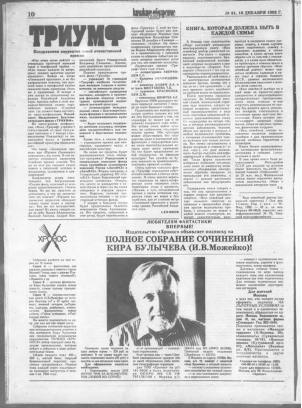Filed Under: Print > Literature > The Triumph Prize
The Triumph Prize

A. Efimov, "Triumf. Pozdravliaem laureatov novoi otechestvennoi premii," Knizhnoe obozrenie, 18 Dec 1992: 10.
Launched in 1992 and trumpeted as the first independent cultural prize in post-Soviet Russia, the Triumph seemed destined to succeed—and yet it failed. The Triumph foundation was established and funded by Boris Berezovsky (1946-2013), a wealthy businessman and soon-to-be oligarch who was always one step ahead of the pack. He had gotten rich early and now, before any of his peers, decided to convert some of his wealth into cultural power. The novelist Zoya Boguslavskaya (1924-), Berezovsky’s chosen head of the Triumph prize, quickly set about bringing together Soviet and imperial symbols to inform its vision for Russian culture. The prize was announced at the Soviet (now Russian) Academy of Sciences; the award ceremony would be held at the Bolshoi Theatre; and the prize medallions were emblazoned with an image of the triumphal arch in St. Petersburg, erected in 1814 to celebrate Russia’s victory over Napoleon. The appeal to Russia’s imperial grandeur was not intended to be subtle—and it wasn’t. As conceived, the Prize fit with a widely held post-Soviet hope for a return to Russia’s (largely imagined) pre-Revolutionary global stature.
The prize was richer than its competitors, awarding larger sums than, for instance, the recently imported Booker. At the same time, the Triumph projected a relationship to the arts midway between aristocratic patronage and the socialist welfare state. It promised not only prizes, but also grants for “talented young creators and performers without means,” funding for exhibits and shows, and even “support to cultural figures who have lost the ability to work or who have fallen onto hard times.” In other words, even though it was funded by post-Soviet capitalism’s most favored son (for the moment), it was not a capitalist prize, but an expression of the belief that, in Boguslovskaya’s words, “culture cannot (and should not) support [soderzhat’] itself.”
Unfortunately, that belief proved to be out of step with the times, as did the prize infrastructure. Instead of generating suspense and creating media scandals, as the Booker did, the Triumph deflated any speculation by announcing laureates ahead of time. The laureates, too, were not meant to be exciting young creators—or even masters at the height of their power—but lifetime contributors. In other words, the Triumph celebrated not an exciting culture in the process of becoming, but the achievements of a bygone era. And, given the advent of a culture market, the prize’s economic models—both patronage and the social welfare state—were already obsolete. Only a culture capable of withstanding market conditions could hope to survive and dominate the mainstream.
The prize was richer than its competitors, awarding larger sums than, for instance, the recently imported Booker. At the same time, the Triumph projected a relationship to the arts midway between aristocratic patronage and the socialist welfare state. It promised not only prizes, but also grants for “talented young creators and performers without means,” funding for exhibits and shows, and even “support to cultural figures who have lost the ability to work or who have fallen onto hard times.” In other words, even though it was funded by post-Soviet capitalism’s most favored son (for the moment), it was not a capitalist prize, but an expression of the belief that, in Boguslovskaya’s words, “culture cannot (and should not) support [soderzhat’] itself.”
Unfortunately, that belief proved to be out of step with the times, as did the prize infrastructure. Instead of generating suspense and creating media scandals, as the Booker did, the Triumph deflated any speculation by announcing laureates ahead of time. The laureates, too, were not meant to be exciting young creators—or even masters at the height of their power—but lifetime contributors. In other words, the Triumph celebrated not an exciting culture in the process of becoming, but the achievements of a bygone era. And, given the advent of a culture market, the prize’s economic models—both patronage and the social welfare state—were already obsolete. Only a culture capable of withstanding market conditions could hope to survive and dominate the mainstream.